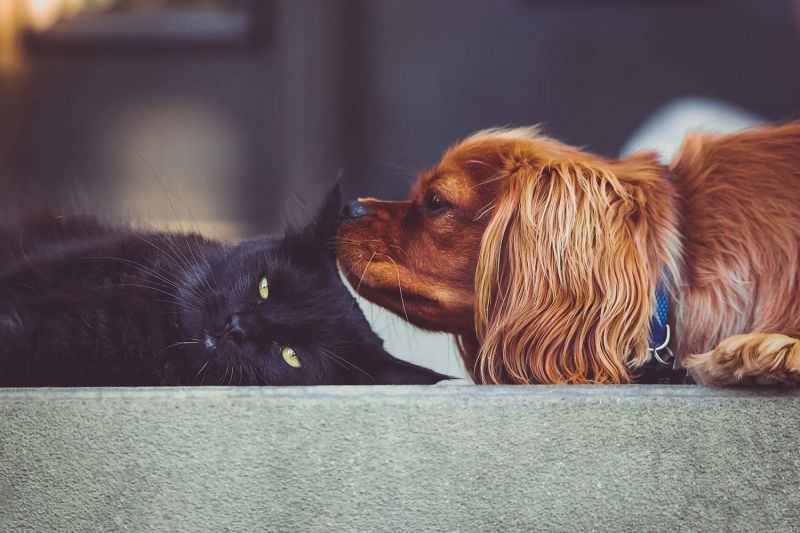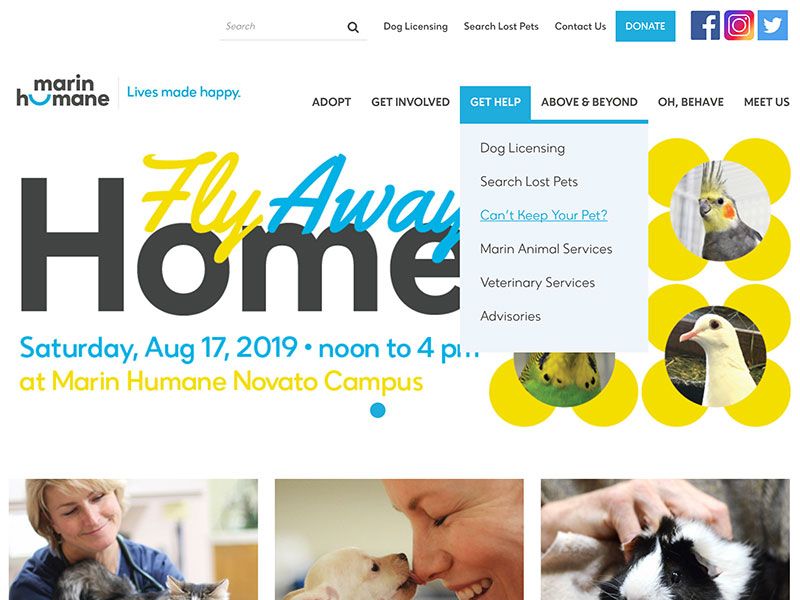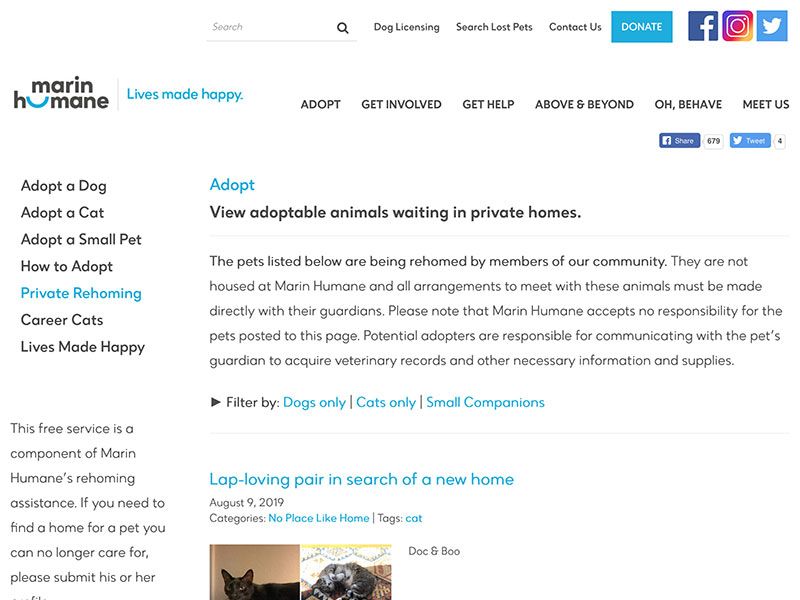No place like home
Should your animal shelter offer a private rehoming service?
July 11, 2019

For as long as there have been newspaper classifieds and online forums, pets have found themselves listed for rehoming—often with very little oversight or support. Why is that?
Pet owners and potential adopters may avoid their local shelter for a variety of reasons: the guardian may be worried about the ultimate fate of their beloved pet after he or she enters the facility, and instead choose who may adopt their beloved companion themselves. On the other hand, potential adopters may wish to avoid the overwhelming experience of walking past long rows of kennels filled with barking dogs or terrified-looking cats, unable to determine a pet’s “true” temperament in this stressful environment.
What if we could prevent animals from coming to the shelter in the first place? Offering a place for pet guardians and potential adopters to connect directly can be part of the solution—and that’s what we’re doing with Marin Humane’s No Place Like Home program. Equal parts surrender diversion and adoption promotion, such a program can be fully integrated across shelter operations. Consider offering an option for pet guardians to submit an online profile of their pet at no charge—as well as resources which might help them keep the animal in his or her home after all. At the same time, submitted and approved pet listings increase options for prospective adopters who may be searching for particular breeds, wish to avoid visiting a shelter, or otherwise would prefer to adopt a pet on their own schedule.
This service works best for guardians who are not facing an immediate need to give up their pet, and want to privately rehome the animal.
What would a practical implementation of this program look like? To submit a rehoming profile, pet guardians fill out a short survey form on the Marin Humane website. They reach the form through the “Can’t Keep Your Pet?” link, which is easy to find due to its straightforward label.

In this section, they will learn about a free behavior help hotline, as well as Marin Humane’s Pet Care Assistance and Pet Safety Net programs designed to assist low-income residents with financial support. In addition to detailing the surrender process, this page also links to the private rehoming section.
Likewise, prospective adopters who browse Marin Humane’s website for adoptable animals will see a link to pets available for private rehoming on all adoption-related pages. A “Private Rehoming” link with profiles of listed pets is prominently placed in the main adoption section of the website.
This placement is intentional: we don’t consider this program to be “competing” with our adoption services, but rather to complement it. By providing more choices to adopters, more animals will find loving homes—whether they have already been taken to a shelter, or are still living with their guardians.
Technical Implementation
The technical implementation of this program was determined by our existing web solutions, but can likely be replicated on other platforms. At its core, each pet profile submitted to Marin Humane that meets the program’s guidelines will be published as a blog post with specific categories and tags. A Wordpress plugin called Formidable provides a user interface for members of the public to submit a form and attach an image.
The plug-in automatically generates a draft of a blog post and notifies key staff members via email whenever a submission is successfully completed. These staff members will review, approve, or reject the draft post in question. The vast majority of submissions are approved; occasionally, adoptions staff will follow up with the person who submitted the information to clarify and discuss potential issues. This interaction often leads to a touch point where productive conversations and offers of support or referral to additional resources happen.
No specific technical knowledge is needed for staff to review and manage submissions. Almost any type of web content management system will allow for blog posts or similar content to be published by non-technical users. If automatically creating drafts is not an option, or plug-ins are not feasible, submissions may be collected via Google Forms, email, etc., and then manually pasted into online posts. Shelters might also consider hosting these animals directly through their pet management software, perhaps under a special category or status that can be queried for specifically.
For liability reasons, we also include disclaimer, which we add on the pet profile submission page as well as the page listing animals available for rehoming. This disclaimer informs the public that these pets are not housed at the shelter, are not under the shelter’s care, and all correspondence and arrangements will happen directly between the prospective adopter and current guardian.

Tracking Submissions and Outcomes
Tracking the animals’ outcomes is a cornerstone of this program; key metrics will help inform strategic decisions for the years ahead. We recommend having tracking systems and responsibilities in place before launching the program. In Marin Humane’s case, this includes at least one follow-up phone call per listing after a predetermined amount of time.
Preliminary Results
From January to August 2018, Marin Humane has published 81 pet profiles. Nearly 26% of listed animals (21) were confirmed to have found a new home through their No Place Like Home listing. Species successfully rehomed include cats, dogs, rabbits, guinea pigs, cockatiels, and—somewhat famously among staff—a tarantula. Only in the case of six animals did their guardian end up surrendering the pet to Marin Humane. Three pets remained in their original home; their guardians requested we remove the listings as they decided to keep their pet after all. Two animals were placed through other shelters, including one breed-specific rescue group. In one case, the owner decided to euthanize their pet.
Eight submissions were removed after 60 days or longer, without data on the outcome, since we were unable to reach the guardian.
Since its launch in early January through August 2018, all No Place Like Home listing pages amassed a combined ~91,000 page views, accounting for 6.6% of Marin Humane’s total web traffic during that period. Significantly, more than half of those visitors continue on to the second page, and another 72% scroll even further to view additional pages, suggesting that potential adopters are interested enough to navigate back in time and explore older listings.
No Place Like Home is an unconventional program for a shelter and is in a sense unintuitive; after all, the core “business” of an open-admission animal shelter is to house strays and accept animals surrendered by the public. NPLH tends to subvert this premise by explicitly encouraging pet owners to keep the animal until a new home is found. Rather than handing the animal over to a shelter and relinquishing all rights, pet guardians take an active role in the process.
No Place Like Home empowers pet guardians to make crucial decisions about their pet, including one of the most important choices pertaining to an animal’s wellbeing: their future home.
We hope our pilot project will inspire other shelters and organizations to implement a version of this program that will match their particular situation and requirements. By providing additional options for adoption and rehoming, animal welfare organizations can build loyalty and name recognition in the community, and remain top-of-mind for animal-related services.
Credits
We would like to thank the Humane Society of Sonoma County for inspiration based on their implementation of a private rehoming program, called “Adoptions by owner”. In addition, special thanks go to Ruthie Tolleson, Catherine Tryon, and Keri Fennell for their relentless advocacy for No Place Like Home in its current form at Marin Humane.

